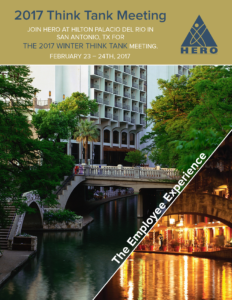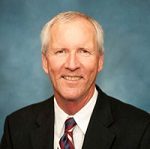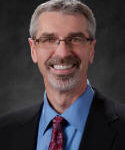Paul’s Five Workplace Health Promotion Predictions for 2017 (and two New Year’s Resolutions)
My first prediction for 2017 is such a no-brainer that I’m not going to count it against the five others dispersed throughout this month’s HERO Brief. That is, the pace of change in our field will continue to accelerate. That’s why I’m such a fan of New Year’s Resolutions and predictions. They cause us to pause. It takes disciplined reflection to decide what’s important enough to intentionally change and what’s likely enough to occur that we should make space for it in our strategic plans. My only wish is that we could give ourselves such pauses daily, not yearly. For a captivating argument that this seemingly inexorable pace got launched in 2007, a ‘vintage year’ for technological change, read Thomas Friedman’s new book: “Thank you for being late.” There is a generous amount that covers this idea in Amazon’s book sample.
In this month’s brief, I offer “Paul’s Predictions 2017,” and you’ll discover why I think this will be a vintage year for collaboration among HERO members. The HERO team has resolved to offer new committees and new challenges for existing committees that respond to what our members are saying and prepare us to influence what should be trending most strongly in our field. Predicting that 2017 is slated for uncertainty in federal health policy doesn’t take a crystal ball, but anticipating what changes are in store for the ACA wellness provisions will compel us to convene HERO’s best minds. Read on for details about our policy, public relations and other committee opportunities. You’ll also see that I’m predicting strategic planning and the voice of the consumer will take a front seat in the year ahead. Read on about how our February Think Tank is designed to honor Abe Lincoln’s idea that “the best way to predict your future is to create it.” It’s also easy to predict that HERO members will carry forth their fecundity as thought leaders in our field as is evidenced by this month’s list of readings to keep you current. As usual, many of the best stories I’ve curated for you this month come from your fellow HERO members. In my closing notes, I make a prediction that makes the case for my resolution to not feed, or read, the trolls. But I qualify this resolution with a heartfelt prediction that our future health promotion workforce is already transcending social media. Read on.

Paul’s Predictions 2017: #1. The Voice of the Employee will be amplified.
This prediction is already unfolding because we’re getting out a megaphone on behalf of employee-centered health promotion at our Think Tank and at HEROForum17. While many industries are well known for their deep reliance on the voice of their consumers, employee health and well-being initiatives have arguably been oriented toward a business case responsive to the needs of the employer.
 HERO Winter Think Tank (members only event)
HERO Winter Think Tank (members only event)
February 23-24, 2017 – San Antonio, TX
Does the movement “from wellness to well-being” signal a shift away from costly employee risks to the organizational value added if we better tap employee assets, needs, and diversity? If your organization’s
health and well-being initiatives were entirely employee-centered, how would they be different? If companies no longer paid for health care, would they still invest in employee health? These are just an inkling of questions this Think Tank is designed to address. For the working agenda, click here.
Notes available from our September ‘16 Sustainability Think Tank
As a reminder of what was discussed during this year’s 2016 HERO Pre-Forum Think Tank Meeting, HERO Project Specialist Emily Wolfe has compiled a summary available now in the members’ only HERO Resource Center. If you missed the meeting, please take a few minutes to read the notes collected during roundtable discussions on Sustainability and Workplace Health and Well-Being.
Paul’s Predictions 2017: #2. HR Department strategic plans will increasingly focus on employee health and well-being.
As has been demonstrated by our research using the HERO Health and Well-being Best Practices Scorecard in Collaboration with Mercer©, organizations with strategic plans for their wellness offerings achieve better employee health and performance related outcomes. Still, we also find that too many organizations don’t have a strategic plan for employee wellness and that hasn’t changed in recent years. Again, ala Lincoln’s notion that we need to create our future, HERO will be actively engaging national experts and members to feature the benefits of strategic planning in our forthcoming events, with HEROForum17 preferentially featuring employers who are strategic about health and well-being.
HEROForum17 – “Engagement and the Emerging Workforce.” September 12-14, 2017 – Phoenix, AZ
The HEROForum17 call for presenters is now open, and we are seeking presentations from a rich cross-section of the health and well-being field. We will be especially interested in presentation submissions that feature employers who used strategic planning based on baseline data and who used evidence-based approaches for improving health, well-being, and performance.
In keeping with HERO’s reputation as host of a learning experience that is practical and thought-provoking as well as agenda-setting for our field, we will be offering an eclectic number of conference tracks with learning objectives that advance our theme and address other timely issues in health and well-being: diversity and workforce engagement; measures that matter; skills, motivation, autonomy; sustainability; and well-being. And, you’ll be hard pressed to find a more beautiful setting for connecting with others who share your passion for improving health. Here is our HEROForum17 presenters’ guide.
Continuing Education at Harvard
When it comes to advancing a goal of using more strategic planning in health promotion, particularly relating to the value of integrating workplace health and safety, no one has been more influential than Dr. Glorian Sorensen and her teaching colleague and HERO member Dr. Nico Pronk. Here is a forthcoming course that aligns wonderfully with my predictions for 2017.
Work, Health, and Well-being: Frameworks, Evidence and Applications; February 6-8, 2017, Boston, MA
This continuing education program focuses on using integrated approaches to workplace health and safety to improve employee health and ensure a safer, healthier work environment. Participants will also learn to:
- Make the business case for worker health protection and promotion
- Translate successful occupational health studies into solutions
- Address the impact of the changing workplace on employee health care costs, health-related productivity loss, and health and safety initiatives To learn more about this course and register, visit the program website.

Paul’s Predictions 2017: #3. Federal Health Policy Shifts will increase employee accountability for health.
While rescinding the Affordable Care Act (ACA) appears certain, promises of a quick and more effective replacement will likely be hard to keep. The wellness provisions of the ACA, however, seem less likely to change given the size of related disruptions afoot. Eliminating the “insurance mandate,” as one example, could produce more of the cost shifting to low-wage, high-risk employees that critics of the wellness provisions say is already occurring because of the use of ACA related incentives. Similarly, reduced funding for community prevention programs also appears likely which could put more of the onus for health promotion on employers and health care systems. HERO is responding to these accountability and ownership issues with new committees that we urge you to consider in 2017. They provide you and your colleagues terrific learning and professional development opportunities, additionally they’re designed to enable your organizations to lead our field and nation in the right direction.
HERO launches new committee opportunities
- Policy Committee: Chaired by Laurie Whitsel (American Heart Association), this committee will convene first on Monday, January 30, to discuss health policy issues trending under a Republican controlled Congress. We’ll also consider the ruling on the AARP challenge to EEOC on data privacy. Also relating to the ACA wellness provisions and employee accountability, we’ll examine the Orion Energy decision concerning voluntariness and safe harbor protections related to their use of wellness incentives.
- Workplace Performance Study Committee (formerly Health, Performance & Productivity Study (HPP) Study Committee): This committee will seek to understand the relationship between workforce health strategies and employee and organizational well-being, performance, and productivity. This includes research demonstrating how workforce health and well-being efforts advance strategic business performance objectives as well as individual employee performance. The specific charter and deliverables will be defined by the newly formed committee in 2017. Jack Groppel (J&J Human Performance Institute) and Josh Glynn (Google) will continue to co-chair the committee.
- Public Relations Committee: We’ll convene to develop a more strategic public relations strategy to proactively engage media in the value of wellness and more widely distribute the learnings from HERO committees.
If you are interested in joining one or more of these committees, please contact Karen Moseley.
 Paul Terry named editor in chief of the American Journal of Health Promotion
Paul Terry named editor in chief of the American Journal of Health Promotion
On January 5, 2017, SAGE Publishing announced, in this press release, that Paul Terry, Ph.D. has been named editor in chief of the AJHP, a leading scientific periodical for research that advances healthy behavior and communities around the world. Taking over for Michael is both humbling and daunting, given his extraordinary leadership with AJHP, as well as for the broader field of health promotion. I am intent on channeling his high standards every time I review a submission.
 Nico Pronk named President of HealthPartners Institute
Nico Pronk named President of HealthPartners Institute
I’m delighted to report that HERO’s Co-Chair of the Employer-Community Collaboration Committee has accepted a new position leading innovative research and education at HealthPartners. As the press release states, Pronk has been a member of the Task Force on Community Preventive Services; member of the Roundtable for Obesity Solutions at the National Academy of Medicine; and founding and past-president of the International Association for Worksite Health Promotion.
 Marin Koentopf joins HERO as a Project Coordinator
Marin Koentopf joins HERO as a Project Coordinator
We are thrilled to have a new team mate at HERO who, among many duties, helped pulled together this Brief! Trained in family social science from the University of Minnesota, Marin has worked in project management, event planning and marketing. Her non-profit work experience was with the Ronald McDonald House Charities, Upper Midwest and she distinguished herself from many other applicants with her obvious passion for health, education and community service.
Healthy Workplaces, Healthy Communities – Website Award Winner
Healthy Workplaces, Healthy Communities (HWHC) has received the Web Marketing Association’s 2016 WebAward for Non-Profit Standard of Excellence in web development. The website was developed by HERO through a grant from the Robert Wood Johnson Foundation to encourage employer and community collaboration and serves as an online hub with resources, tools and strategies. Click here to learn more.

Paul’s Predictions 2017: #4. Interest in employee well-being will spawn new programs and measures for sleep, purpose, culture and community connectivity.
HERO members have used our committee infrastructure to spark productive dialogue and debates about where health and well-being initiatives can bring the most value to the American workforce. Read, for example, Dr. Jessica Grossmeier’s retort to “the gadget apocalypse” to see how pragmatic findings from our committee work can put the narrower findings from a research study into perspective. The readings below show that the practice based use of incentives seems to be waning, but that new variables like sleep, food policy and community connectivity will be getting more attention in 2017.
US Employers and Wellness Programs
The results of two wellness surveys were recently released, both offering key insights and market data on the following topics:
Predicting the Future of Employee Well-being
2016 brought tremendous innovation and change to workplace well-being and engagement programs. So what’s in store for 2017? Read on to learn what scientists from The Virgin Pulse Science Advisory Board predict for the future of our rapidly evolving industry.
Rules for Employer Wellness Incentives Blocked…For Now
A federal district court has denied AARP’s request to stop implementation of Equal Employment Opportunity Commission rules on wellness program incentives; however, the legal challenge is pending. Find out why the court’s denial of AARP’s motion to block the Equal Employment Opportunity Commission regulations is “good news” for employers but “no surprise.” HERO member Jim Pshock from Bravo Wellness will serve on our HERO policy committee. He notes that additional insights are available here and here.
“It’s Clear that Moving Matters”
A new study, featured in The New York Times, reveals why “even a little bit of activity spread throughout the day, is a practical, easy way to improve well-being,” according to Dr. Jack Groppel, a study author. Dr. Groppel is co-chair, with Google’s Josh Glynn of the HERO Workplace Performance Committee and co-founder of the Johnson & Johnson Human Performance Institute. Read on for insights gained.
The Value of Employee Health and Low-Wage Workers
Wellness programs can produce health cost savings, but measuring the savings alone can “limit the understanding of the broader impact that those programs may have.” HERO member Dr. Bruce Sherman recently offered a well-attended HERO Wednesday Webinar on how low-wage workers have considerably different utilization patterns in wellness. The data he shared will be embargoed until his research is published in Health Affairs. Until then, he will also be a discussant on this subject at our February Think Tank. Read here to learn how employers are evaluating the value of wellness programs.
American Heart Association’s Policy Report
The latest edition of the AHA’s Policy Report features a new look and layout that is easy to scan and share with your networks. It opens with a message about how the recent election has affirmed the need for evidence-based and timely policy analysis and strategic thinking. The issue also highlights different taxation models and their ability to change the consumption of sugary beverages.
Food Policy and Diet Drinks
“Far from helping to solve the global obesity crisis, artificially-sweetened beverages may be contributing to the problem”. Read on for more considerations when deciding food access policy at the workplace.
Guidance for Managers to Address Physical Inactivity
HERO members Dr. Jack Groppel and Tim Butler (Select Health/Intermountain Healthcare) are part of a HERO workgroup that aims to provide employers with guidance on how to address physical inactivity at
the workplace. They teamed up to author an article in Employee Benefit News that provides managers with practical advice on how to support movement throughout the course of the workday. Read more here.
Plants and Preventative Health
A plant-based diet is increasingly being recognized as a fundamental component of preventative health. Kaiser Permanente, a HERO member, is now urging health care providers to recommend it to their patients to maintain health and reverse disease. Learn more about the multiple benefits of this dietary shift.

I’m jazzed for the opportunity to serve as the American Journal of Health Promotion’s new editor in chief for myriad reasons but primarily because it offers such a credible and regular platform for supporting and influencing those dedicated to continuous improvement for our field. Still, Oscar Wilde’s “no good deed goes unpunished” quote looms as I share another prediction that, sadly, is another no-brainer: with this added role I’ll be a more regular target for internet trolls. I’ve written before about “Opposing views and civil discourse” (ask if you’d like a copy), but for HERO members I’d add a note explaining why I choose to ignore the blogger critics. We’re fortunate to work in a profession with a scant number of vociferous critics. My take is that there is one thing these few angry loners want more desperately than attention: that’s to be taken seriously. What they fail to comprehend is that as they’ve gotten ever more farfetched and vitriolic in search of the former, they’ve cinched their inability to attain the latter.
Baiting people with misinformation and offensive insults (but just a tad under highly offensive) is a pesky ploy that trolls hope will eventually land a bite that confers credibility where there is none. Even reading such drivel is a form of taking the bait; responding is swallowing it whole. Some say dishonesty should not go unchallenged and I respect their view; nevertheless, I’m convinced responding to bloggers who show disdain for our field is an utter waste of time. I’ve rarely been persuaded to respond to bloggers, and each time I did it affirmed my worry that, more than a waste, it’s counter-productive. That’s because they’ll not only incessantly recycle their original misstatements, but worse, they’ll misrepresent your response and use it as fodder for more disinformation. The opportunity costs lost to reading such blogs is high; after all, it’s time away from our work of continuous improvement for our field. Given how much more science reading I’m doing in my new role with the Journal, I’ll continue in my resolve not to feed or read the trolls.
This last paragraph took more time to write than the subject deserves given how, oddly, even anti-blogger content offers bloggers sustenance. Forgive me and allow me a few more compensatory sentences on a final, somewhat related, but altogether more hopeful prediction:
Paul’s Predictions 2017, #5: “Our Field will more fully embrace concepts of gratitude and kindness as variables that measurably advance health and well-being.”
 A regular testament to my love for our profession, one I hold dear in more ways than one, comes in the form of my daughter Anna, a public health nurse who now works in a job that includes support for worksite health promotion. We regularly exchange articles and she’s better read than I in positive psych, gratitude and brain science (i.e. Love 2.0). She gifted me “Saving Gotham,” a book about changing culture that I’ve recommended more often this past year than any other, and she’s written about how my enthusiasm for my work influenced her decision to choose public health. I couldn’t be more grateful to see her carry the torch. I’d characterize the health promotion profession I grew up in as being dominated by passionate advocates who lead with authenticity, take science seriously and hold an abiding respect for each other and those we serve. I’ll admit that being the target of mean-spirited bloggers can be disheartening and has cost me some sleep, but I know the field my daughter will forge ahead with has compassion and caring that’s bone deep. That we are now building good science around the health benefits of purpose, kindness and love is like a troll vaccine, one that makes me proud of our profession and excited to see where our future leaders will take us.
A regular testament to my love for our profession, one I hold dear in more ways than one, comes in the form of my daughter Anna, a public health nurse who now works in a job that includes support for worksite health promotion. We regularly exchange articles and she’s better read than I in positive psych, gratitude and brain science (i.e. Love 2.0). She gifted me “Saving Gotham,” a book about changing culture that I’ve recommended more often this past year than any other, and she’s written about how my enthusiasm for my work influenced her decision to choose public health. I couldn’t be more grateful to see her carry the torch. I’d characterize the health promotion profession I grew up in as being dominated by passionate advocates who lead with authenticity, take science seriously and hold an abiding respect for each other and those we serve. I’ll admit that being the target of mean-spirited bloggers can be disheartening and has cost me some sleep, but I know the field my daughter will forge ahead with has compassion and caring that’s bone deep. That we are now building good science around the health benefits of purpose, kindness and love is like a troll vaccine, one that makes me proud of our profession and excited to see where our future leaders will take us.
